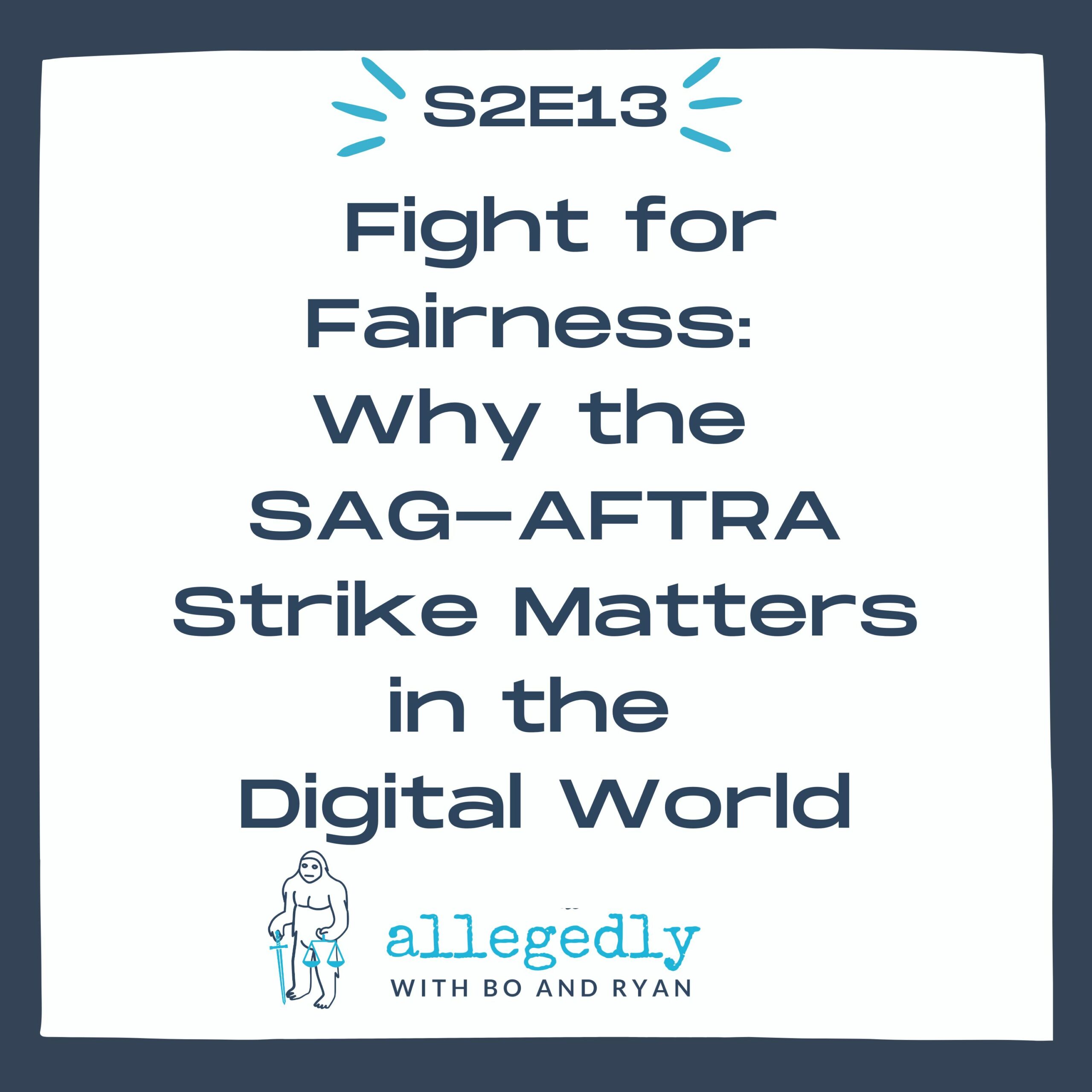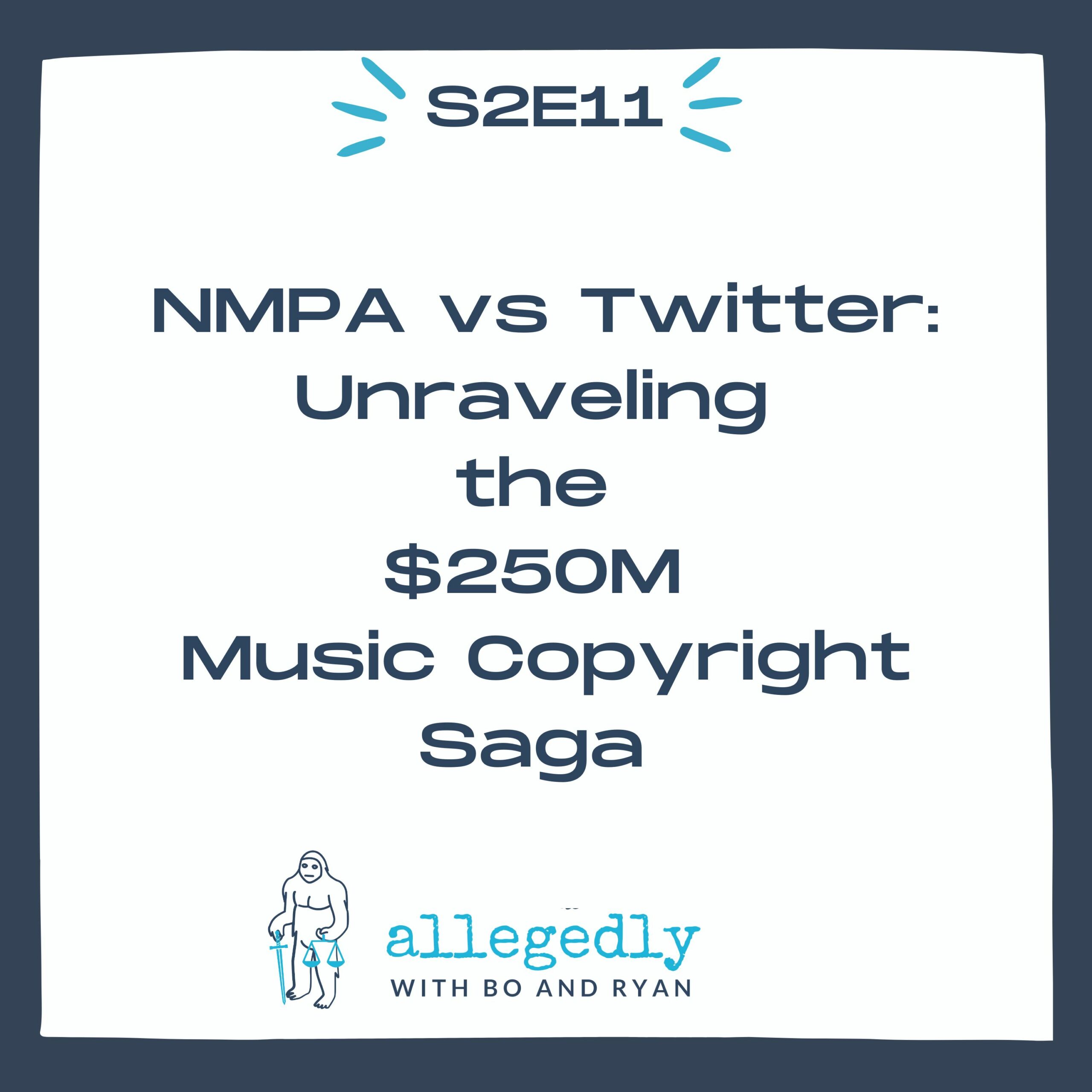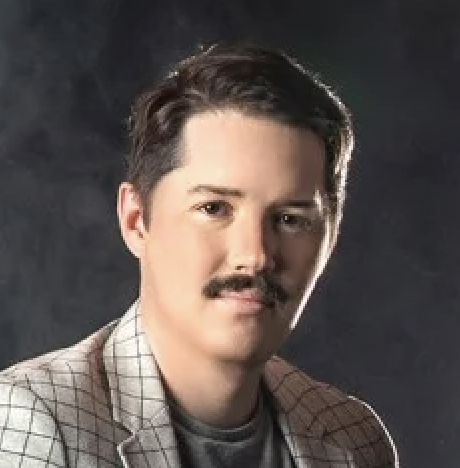allegedly with Bo and Ryan | Season 2 Episode 12
Allegedly… with Bo and Ryan Podcast S2E12| Transcript
Ryan: [00:00:00] Welcome to Allegedly with Bo and Ryan, the only entertainment and law podcast that brings you the truth, the whole truth and nothing but the truth …
Bo: [00:00:09] Allegedly. I’m Bo Bowen.
Ryan: [00:00:11] And I’m Ryan Schmidt.
Bo: [00:00:13] And you’re listening to Allegedly with Bo and Ryan. We’re coming to you from our law offices in beautiful historic Savannah, Georgia, where we’ll be chatting about pop culture, hot legal topics in the news, and doing our best to change the way people think about the law and lawyers. But first, a little about us. Ryan is such a talented wheelman that he once parallel parked a train.
Ryan: [00:00:37] And not a lot of people know that Bo’s blood actually smells like Cologne.
Bo: [00:00:41] Together, we are the only entertainment lawyers in the free world who have never lost a single case … Allegedly. Welcome to another episode of Allegedly with Bo and Ryan, the show where we serve as your trusted guides to navigate the murky waters of entertainment law.
Ryan: [00:01:00] And to keep you in-the-know, and hopefully lawsuit free. I mean, today we’re diving into the enthralling world of product placement in film and television.
Bo: [00:01:11] Ah, product placement. You know, we almost had some in those intros there. Ryan you kind of you kind of got me there with the blood smelling like Cologne.
Ryan: [00:01:18] I mean. Well, it’s true.
Bo: [00:01:18] I was like thinking, you know, listen. To my enemies: If you try to harm me, you only make me more desirable.
Ryan: [00:01:28] Noted.
Bo: [00:01:30] So product placement, I mean, that is I mean, it’s a very interesting, intricate and definitely big business when it comes to film and television. It’s very tricky. You got to be careful when you come to product [placement]. There’s a lot of issues people don’t really think about.
Ryan: [00:01:47] Oh, for sure.
Bo: [00:01:47] I mean, I can’t tell you how many times that I’ve read one of my client’s scripts and had to ask, “Hey, you did get the rights to that, right?” It’s like, it’s pretty much every time, panic and chaos ensue. But ultimately, we go through the issues that we can and we can always typically come up with a solution. So I think today, as we talk about this, maybe let’s do our best to simply try to very simply explain this this area of the law and how product placement works, and the best way to do it, and people can then maybe avoid some of that drama.
Ryan: [00:02:29] Agreed.
Bo: [00:02:30] So, well, that brings me, Ryan, to one of the current shows that we were talking about that kind of sparked the idea for this episode. Now, have you caught that new Peacock series? It’s called “Based on a True Story.”
Ryan: [00:02:46] Oh yeah. The one where the couple starts a true crime podcast to investigate murders in their own neighborhood, and they actually to partner up with the murderer for better podcast ratings. It’s pretty wild.
Bo: [00:03:00] Yeah. And you know, here we are doing a podcast and you can’t help but maybe get some ideas. But you know, but in fairness, you know, they didn’t have the built in advantage of having the Ryan Schmidt to talk to every week. So they had to come up with something,
Ryan: [00:03:16] I get it.
Bo: [00:03:17] So but the most controversial element of the show thus far, you know, at least legally, it hasn’t been any of the, you know, crazy plot twists or even the idea of partnering with the murderer. You know, actually, it was, are you ready for this? It was actually a product you see in about the first ten seconds of the episode: a fitness mirror.
Ryan: [00:03:45] Ah, yes, a fitness mirror. That technologically advanced mirror that provides personalized coaching, exercise classes, a real time health feedback. You know, like what you have in your own home, in your own bedroom, Bo, I’m sure. But apparently this also doubled as a murder weapon in this show. And I have to say, quite an unusual product placement.
Bo: [00:04:09] Well, luckily, the producers of the show learned from some of the fails that were going to be talking about today, and they elected to use a fictitious brand name, ExoGlass, you know, as opposed to the the real name of any of the fitness mirror companies. And there’s there’s like 4 or 5 major ones.
Ryan: [00:04:31] Which one do you have?
Bo: [00:04:34] Any mirror I look into is a fitness mirror.
Ryan: [00:04:37] That’s right.
Bo: [00:04:39] But look, you know, the fact is product placement is an extremely powerful promotional and funding tool in the entertainment industry. But, you know, some of it, I mean, we look at it and it and it really does just make us scratch our heads. This fitness mirror is an example. There’s a reason the filmmakers had to make up a fictional company name. I mean, they had to think, is any real fitness mirror company really going to want their product so closely associated with death and murder?
Ryan: [00:05:17] Ah yes. Selling gold. But it’s a tricky, sticky web of marketing and lore for sure. But before we delve into those specifics, let’s rewind a bit. You know, not to play on too much of the film and television puns, but product placement got its big push in the late 80s and early 90s when advertisers got worried that home recording devices, like VCRs and DVRs, would enable people to just skip commercials altogether.
Bo: [00:05:49] I mean, absolutely. Tivo. I remember. I mean, that was one of the greatest things about it. Just going like [imitates button clicking sound] and skipping the commercials. I mean, in fairness, you know, skipping commercials is one of my favorite things in the entire world.
Ryan: [00:06:03] Oh, for sure.
Bo: [00:06:04] You know, I will absolutely be the one that pays the extra 4.99 a month to get the premium, no commercials package.
Ryan: [00:06:12] Must be nice, Bo.
Bo: [00:06:14] Yes, because I am lazy enough to not want to have to hit fast forward. So. But you know when the advertisement, that’s the whole reason behind product placement. If the advertisement for the product is basically sewn right into the fabric of the show, it’s right there in the show itself, You can’t fast forward because, you know, that’s a that’s not an actual commercial. That’s part of the actual program. So when you have a recognizable product that’s being used as a key part of a film or television show, and you see that as you’re watching it, well, you better well believe that there are typically going to be deals and releases in place for that to happen.
Ryan: [00:07:01] For sure.
Bo: [00:07:02] But obviously, not always the case.
Ryan: [00:07:06] And that’s where things get interesting for today’s show. You know, for any filmmakers that are tuning in, we have a two pronged rule of thumb for you to keep in mind. So generally, you don’t need a release if the product isn’t used in a way that: [1] implies sponsorship by the manufacturer; or [2] disparages the product. I say generally because there are situations where these lines are of course blurred. If that all sounds like too much to consider, either get the proper clearance from the owner of the brand or use a fictitious name and logo like we’ve seen on Peacock’s “Based on a True Story.” But speaking of legal disputes that might arise when one of those factors aren’t met, there’s a case that really stands out. Do you remember what happened with that movie, “Dickie Roberts, Former Child Star?”
Bo: [00:07:58] Do I remember anything besides it being truly f**king terrible?
Ryan: [00:08:03] Fair enough.
Bo: [00:08:05] Yes, I know exactly what you’re talking about. I assume you’re talking about the legal case that arose from that. That was the Wham-O v. Paramount Pictures. I mean it caused quite a stir at the time?
Ryan: [00:08:17] Oh, for sure. I mean, that movie centers around– it’s a terrible movie. I mean, you got David Spade in that era, you got Dickie Roberts and Joe Dirt. He was just killing it. Okay. Anyway, the movie centers around former child star, played by David Spade, who’s trying to revive his acting career. And there’s this one particular scene.
Bo: [00:08:39] Oh, the infamous slip-n-slide scene. So if you remember Dickie Roberts, he first tries to use the slide completely dry without adding any water. And predictably, skins himself alive, basically. Like that sound it made still haunts my nightmares. I mean, it is hard to watch.
Ryan: [00:09:04] Oh, it’s terrible.
Bo: [00:09:05] But but that isn’t the part that was really the issue. It’s what Dickie Roberts did next that caused the problem. So he decides, look, water alone, that’s not going to create the thrill he’s seeking. So he decides instead to pour oil on the slide, leading to him, of course, sliding across the entire yard, crashing through a picket fence. You know, the scene was so kind of ubiquitous to that movie. It was even featured in the trailers to promote the film.
Ryan: [00:09:37] Oh, exactly. I mean, I remember seeing this and being like: okay, I know what I’m getting in for, for this movie. But here’s the catch. Paramount Pictures didn’t seek the permission of Wham-O, the creator of slip-n-slide to use their product or their product’s name in the film, which then, of course, Wham-O decides to sue Paramount for trademark dilution and infringement.
Bo: [00:10:00] Right. They argued that the movie’s portrayal of their product was tarnishing their trademark by negatively impacting the perception of slip and slide as being unsafe.
Ryan: [00:10:14] But as we know, the court didn’t ultimately see it that way. They ruled that the misuse of the slide in the movie was so obvious and unmistakable that no one would believe that the slip-n-slide was an inferior product when used properly with just regular water, not oil. They didn’t think that there was any tarnishment and they just pitched out this case.
Bo: [00:10:32] Right? So it goes to that one factor you were talking about: avoiding disparagement. The court essentially said they’re not really disparaging it because no one would believe that’s how you’re supposed to use a slip-n-slide. Everyone would know that was exaggerated for the movie.
Ryan: [00:10:47] Or dry.
Bo: [00:10:49] Yeah. Oh, you’re making me think of that sound again. Please stop that. So but but the case does–even though it was, you know, resolved and thrown out–it does show the potential pitfalls and kind of legal tangles of product placement, especially if it’s not done with proper consent or in an appropriate manner. So Paramount got lucky here, but didn’t really learn their lesson. Okay. They got in hot water again, if you remember, with the 2012 film “Flight.” But this time with an even bigger opponent than Wham-O: Budweiser.
Ryan: [00:11:32] Oof.
Bo: [00:11:34] So, now, in that movie, Denzel Washington’s character, Captain Whip Whitaker, struggles with alcoholism. He’s seen cracking open a cold can of Budweiser before miraculously landing, in a controlled crash, a commercial airplane.
Ryan: [00:11:53] And let me guess, again, Paramount, the company behind this film, didn’t even bother seeking permission from Budweiser, the brand?
Bo: [00:12:01] Nope. And guess what? Didn’t really sit well with Budweiser, did it?
Ryan: [00:12:05] That’s to say the least. So Budweiser requested Paramount to digitally remove the Budweiser logo from the film. They sent this demand, they stated that they’ve always worked super hard to promote healthy and safe alcohol consumption, and they felt that the film implied that they had endorsed irresponsible drinking habits such as operating vehicles while under the influence of alcohol. All fair points. But in the end, Paramount was like: Nah, I’m keeping it in there.
Bo: [00:12:34] Well, you’re right. The logos did remain in the film despite Budweiser’s objections. And Budweiser, interestingly and surprisingly, actually ultimately decided not to file a lawsuit. Most people think it’s because they felt like they had accomplished their goal of distancing themselves from this unsafe use via a very expeditious and effective PR campaign. They really hit it hard and people were talking about it and, you know, that they felt, I guess, in the end was enough.
Ryan: [00:13:06] That makes sense.
Bo: [00:13:07] But I got to be honest. I mean, the slip-n-slide case to me was a way better case than the Budweiser case. I mean, the film “Flight,” actually, I mean, it kind of made it look like you drink a beer and you’re suddenly amazing at everything. I mean, the Budweiser to Captain Whitaker was basically the spinach to Popeye, you know?
Ryan: [00:13:33] Good point.
Bo: [00:13:34] I mean, mean. So to be fair, you know, beer, for example, absolutely turns me into both an amazing dancer and quite possibly the greatest rapper alive.
Ryan: [00:13:47] And I have witnessed this. Well, the fact that Dickie Roberts case was dismissed and the “Flight” dispute never made its way into court doesn’t actually negate the importance of doing things the right way. I mean, it’s always a good idea to get a release whenever possible, and it can save you from a lot of trouble in the long run.
Bo: [00:14:04] Well, for certain, you have to consider it, especially if the product placement can negatively impact a brand. Any kind of disparagement, that is kind of the death sentence there, as in our next very famous example; one involving the Sex and the City reboot, “And Just Like That” on HBO, Max and the company Peloton.
Ryan: [00:14:32] Oh, yes. I mean, that was a major story. And in the show, the main character’s husband, Big, played by Chris Noth, has a heart attack and dies while using a Peloton bike. Now, typically a company would sign a product release for their product to be featured in any TV show or film.
Bo: [00:14:50] Right. Except in this case, Peloton, very quickly and very publicly commented that they did not sign any such release. They did not give any permission. The only agreement they had with HBO was that one of their instructors, Jess King, would appear in the show, presumably on the bike screen.
Ryan: [00:15:12] In fairness, she did appear in the exercise video that Noth’s character was trying to complete when he died on screen. And the negative response to Peloton was immediate.
Bo: [00:15:24] Yeah, to say the least. Immediately following the release of that episode, which was the Reboot’s much anticipated series premiere, Peloton stock prices dropped over 11% overnight. And my favorite stat: Google searches for cancel my Peloton subscription increased by 809%.
Ryan: [00:15:51] Oh my god.
Bo: [00:15:53] I mean it literally cost Peloton millions. So that’s obviously a stark reminder that the use of products in media, it can have real world consequences.
Ryan: [00:16:06] So the company Peloton, who had a million reasons to sue, actually took the high road here. In response, they cleverly pivoted and managed the crisis by creating somewhat of a comedic commercial featuring both the exercise instructor, Jess King, and everybody’s favorite Deadpool, Ryan Reynolds. In the ad, King and North, alive and well, are sitting in front of a fireplace while Ryan Reynolds narrates the cardiovascular benefits of regular cycling.
Bo: [00:16:37] It is worth noting, though, despite the fact they ultimately decided not to, Peloton absolutely could have sued for damages in that case; and very, very likely would have won. I mean, especially given the fact that everyone was talking about that Sex and the City episode and not so much about Peloton’s funny response.
Ryan: [00:16:59] Oh, for sure. I mean, a pro tip to our listeners here, especially filmmakers, if a well known product is going to be used in a scene–especially in a controversial one, such as a character’s death–probably a good idea to clear it first with that product manufacturer. It can not only save a lot of headaches and potential legal disputes down the line.
Bo: [00:17:20] Yeah. Or even if you can’t clear it, just use pseudo products. No one cares. I mean, spoof or generic products that you see on shows all the time, they can be used freely. And since there’s no real company to file a claim, it’s fine. Like, I mean, just like we were talking about ExoGlass in “Based on a True Story.” They clearly learned a lesson from the Peloton story.
Ryan: [00:17:44] Oh, 100%. But we need to remember, you know, when done right, product placement can actually be organic and beneficial. It’s just when it becomes too obvious that viewership can be affected.
Bo: [00:17:56] Yeah, you’re right. I can think of so many examples where the use of product placement actually takes you out of the story, but there is one example of that that is very well known as kind of a product placement fail, and that was Friends. In the 90s, they entered a deal with Coca Cola to have Coca Cola be featured in pretty much every episode and pretty much constantly.
Ryan: [00:18:26] Oh yeah, I remember that.
Bo: [00:18:28] I mean, both viewership and ratings of the show took a huge hit because, I mean, the Coke products were becoming way too visible and too much a part of the narrative. It stopped feeling like a TV show and it really started just feeling like a Coke commercial. So I think that’s a good lesson for both advertisers and filmmakers. Don’t make it so obvious that it literally just begins to look like a straight commercial. Like, [sometimes] you just know, ‘Oh, they paid money to put that in there.’ And when it takes you out of the story, it becomes a problem.
Ryan: [00:19:08] That makes me think of one of the “Men In Black” sequels where they’re going through the MIB headquarters and there’s like a f**king Burger King, like a fast food restaurant in the middle of the headquarters. Like, Oh, we’re gonna date, we’re gonna, like, fight some aliens and like, do you want a Big Mac?
Bo: [00:19:30] I mean, it is wild that. There’s also a scene like that in “The Thomas Crown Affair” with a soda where, like, the one of the characters just suddenly stops, goes, gets a soda out, turns it so the can is facing the camera and then drinks the entire thing over like thirty seconds. And you’re like, ‘What on earth is going on?’.
Ryan: [00:19:50] Right?
Bo: [00:19:50] So it can definitely be counterproductive if it becomes, you know, that obvious. But the reverse can be true as well. There have been times that companies have shelled out big bucks to have their products featured in a film or television show only to be left highly disappointed, because [their product is] really not seen at all. And that doesn’t reflect well on the filmmakers. And that can have some really negative consequences. And, you know, I think one of the the most famous examples of that is the California Raisins in the movie “Back to the Future.”
Ryan: [00:20:32] Okay.
Bo: [00:20:33] California Raisins must have thought they were getting a pretty sweet deal. Okay. You see, the team at California Raisins, they had these high hopes that featuring their product would boost sales. They had, you know, and rightly so, they were convinced that “Back to the Future” was going to be a major movie, and they had to be thinking about the success of Reese’s Pieces after “E.T”. [Reese’s Pieces’] sales skyrocketed after that.
Ryan: [00:21:04] Oh, yeah, for sure. So what does the raisins do? They shell out a cool $50,000 to Universal Studios expecting that their product is going to be so prominently featured in the film. Maybe even Marty McFly will be snacking on some raisins, you know, at some point. But much to their dismay, the extent of the product placement was a mere billboard ad for the “California Raisins.” It was briefly visible in the background behind a drunk homeless man who had passed out in the street. Not exactly the positive image that they were hoping for.
Bo: [00:21:41] Well, and to add insult to injury, do you know what the producers excuse for that was?
Ryan: [00:21:47] I can’t even imagine.
Bo: [00:21:48] Apparently their reasoning was raisins don’t photograph well.
Ryan: [00:21:56] Then why take the money?
Bo: [00:21:58] That’s quite a costly realization. So California Raisin’s Board of directors was understandably upset about this less than stellar placement and immediately demanded their money back, which they did then receive.
Ryan: [00:22:13] Sure. Oh, man. All right. Well, let’s dive into another infamous case. This is the 1996 film, “Jerry Maguire.” Now, you remember that one, right?
Bo: [00:22:22] Of course. “Show me the money.” It had Tom Cruise, Cuba Gooding Jr. I mean, it’s a classic. But you’re right, there was some off screen drama surrounding the movie that not everyone may be aware of.
Ryan: [00:22:37] Exactly. So the film actually struck this big deal with Reebok to feature a fake commercial at the end of the movie. And for those who don’t remember, the film is about a sports agent, Jerry, whose only client, Rod Tidwell, becomes a star after a near-death experience. And so Tidwell, who’s played by Cuba Gooding Jr, lands an endorsement from Reebok, inspiring the sportswear brand to request a fictional ad as part of the plot.
Bo: [00:23:05] But from there, things did not quite go as planned. Oh, no, no. After agreeing to provide $1.5 million worth of shoes, cash and clothing to Tristar Pictures, Reebok found that the finished movie contained a grand total of one mention of Reebok.
Ryan: [00:23:34] And not a very positive one at that.
Bo: [00:23:36] No, it was not.
Ryan: [00:23:37] The one and only mention had Tidwell saying, and I quote, “F**k Reebok. All they do is ignore me. Always have.” Thanks for the 1.5 mil folks. Now, that’s not exactly the kind of publicity they were going for.
Bo: [00:23:53] And even worse still, remember that Reebok had been promised this spoof commercial at the end of the movie. Final Cut comes out, no commercial; [it had been] completely cut from the film. I mean, [it’s] pretty understandable why that did not sit well with Reebok.
Ryan: [00:24:11] No, not at all. I mean, can you imagine getting the invite to that premiere and watching it and you’re the head of marketing and you’re sitting next to your wife like, ‘oh, this is the big moment … Where was it?’
Bo: [00:24:22] Well, yeah, right after. “F**k Reebok.”
Ryan: [00:24:26] For sure. Yeah. Not great. So what does Reebok do? They file a $12 million lawsuit a year after the movie’s release. Ultimately, the case is settled out of court with the terms of that agreement being kept confidential. But it does highlight the potential dangers for brands entering product placement deals.
Bo: [00:24:44] Well, it does underscore the importance of getting explicit agreements in writing. Now, I’m talking about on the part of the manufacturer of the product that’s trying to get its placement. Get an explicit agreement in writing about how that product is going to be featured and ensure that these agreements are then upheld. And to the filmmaker: look, keep your word. If you if you make a deal, follow through with it.
Ryan: [00:25:15] Oh for sure. I mean, in short, companies need to be very clear about their expectations to protect their image. And filmmakers need to know what is expected of them. It can save not only a lot of headache, but potential legal troubles down the road.
Bo: [00:25:30] I mean, and it is a fine line to walk. So, if you do keep those factors in mind, getting permission when necessary, you know, don’t disparage the products, that type of thing, use them in their intended way.
Ryan: [00:25:42] Don’t imply sponsorship.
Bo: [00:25:44] Right. So all of that has to be considered when you’re talking about product. But if you do it right, it can be an effective way to raise money for your film. But there’s always, you know, in the entertainment industry, a little added wrinkle, and that is the actors can have a say in this, too. So Robin Williams, Pamela Anderson, two perfect examples. Robin Williams very famously had clauses in his contracts against all product placements.
Ryan: [00:26:17] Wow.
Bo: [00:26:17] Interestingly enough. And Pamela Anderson, she will refuse to appear on screen with any fur or meat product. So in the end, you really have to strike a balance. You have to balance the interest of the film makers, the advertisers, the actors. And as we discussed before, the audience.
Ryan: [00:26:40] That’s right. I mean, as always, the key is doing your homework, getting legal advice, and navigating these murky waters with caution.
Bo: [00:26:48] Kind of like how we are the fluorescent life vests of the legal world, helping people navigate the murky waters of the law?
Ryan: [00:26:58] Exactly, Bo. Which is why we’re the greatest entertainment lawyers in the history of American jurisprudence …
Bo: [00:27:04] Allegedly. Well, that wraps up today’s episode. We hope you enjoyed our dive into product placement. Next time on Allegedly, please join us as we delve into another hot topic in entertainment law.
Ryan: [00:27:18] Stay informed, stay in the know, and most importantly, stay lawsuit free. Thanks for tuning in.














